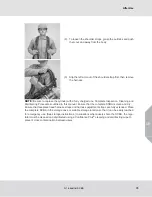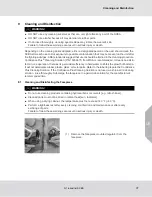
46
Remote Quick-Fill Operation
G1 Industrial SCBA
US
11 Remote Quick-Fill Operation
The Remote Quick-Fill system provides the ability to connect the SCBA to a high pressure air source
for emergency filling operations. Only qualified, trained personal should perform operations using the
Quick-Fill fitting. Standard Operating Procedures should be developed for use of the Quick-Fill fitting.
11.1 Precautions
• The Quick-Fill fitting can only be used to fill approved SCBA cylinders.
• The user is responsible for the air supply, which must meet the requirements of Compressed Gas
Association Specification ANSI/CGA G-7.1, Quality Verification Level (Grade) D Gaseous Air or
better, with a moisture dew point of not greater than -65°F/-54°C (24ppm water vapor, normal). In
fire service applications, MSA recommends breathing air quality in accordance with NFPA 1989.
Pressures at the inlet of the Quick-Fill hose must not exceed that of the SCBA (2216 psi or
4500 psi).
• The user also is responsible for connecting the Quick-Fill hose to an appropriate secondary air
supply.
• The cylinder must be inspected for damage before charging.
• If topping off the cylinder using the Quick-Fill fitting, it is recommended to wait until after the cylinder
has cooled from initial fill. Topping off a cylinder after it has cooled will ensure proper service time.
WARNING!
DO NOT use the Quick-Fill fitting as a “Buddy Breather” such that two users are sharing the air
supplied by one approved SCBA cylinder simultaneously; doing so will void NIOSH approval.
The Quick-Fill fitting must be used by trained personnel only.
DO NOT lubricate the Quick-Fill fittings. Do not permit oil, grease, or other contaminants to come
in contact with the Quick-Fill fittings.
The hose assemblies and fittings are designed to be used with Quality Verification Level (Grade)
D or better air as defined by ANSI/CGA G-7.1.TRANSFILLING AIR FROM A SECONDARY AIR
SUPPLY. In fire service applications, MSA recommends breathing air quality in accordance with
NFPA 1989.
Misuse can result in serious injury or death.
The Quick-Fill fitting must be used only by qualified, trained personnel who have carefully read and
understood these instructions, cautions, and warnings.
11.2 Filling Instructions
A secondary air supply stores compressed breathing air until needed to refill SCBA air cylinders.
When filling, the secondary air supply pressure must be greater than SCBA cylinder pressure. Exam-
ples of air supplies include: cascade air cylinder refilling systems; high pressure compressor systems
with a fixed reservoir; or a portable air system such as the RescueAire™ System.
WARNING!
DO NOT connect a high pressure SCBA to a secondary air supply with a pressure greater than the
rated service pressure of the SCBA. Misuse can result in serious injury or death.












































